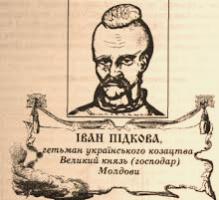Ivan Pidkova (1)
("Ivan Pidkova" / "Bulo kolys v Ukraini")

To V. I. Sternberg (2)
There was a time in our Ukraine
When cannon roared with glee,
time when Zaporozhian men
Excelled in mastery!
They lived as masters—freedom's joy
And glory were their gain:
All that has passed, and what is left
Is grave-mounds33 on the plain!
High are those ancient tumuli
In which were laid to rest
The Cossacks' fair white bodies
In silken cerements dressed.
High are those mounds, serene and dark
Like mountains they appear,
Their gentle whispers to the wind
Of freedom's fate we hear.
These witnesses of ancient fame
Hold converse with the breeze;
The Cossacks' grandson reaps the grass
And sings old memories.
There was a time when in Ukraine
Even distress would dance,
And sorrow in a tavern drank
In honeyed brandy's trance.
There was a time when life was good
In that Ukraine of ours
Recall it then—perhaps the heart
May briefly bathe in flowers.
II
A murky cloud from Liman's shore
Covers the sun from sight;
The sea is like an angry beast
That groans and howls with might. I
t floods the mighty Danube's mouth.
"My fellows, come with me
Within our barks! The waves are wild.
Let's have a merry spree!"
The Zaporozhians rushed out;
The stream with ships was roiled.
"Roar on, O sea!" they all sang out,
As waves beneath them boiled.
Billows like mountains round them surged,
They saw no land, no sky.
Yet not a Cossack heart grew faint,
Their eagerness ran high.
A bold kingfisher flies overhead
As on they sail and sing;
The brave otaman (4) in the van
Leads on their mustering.
He strides the deck, and in his mouth
His pipe grows cold from thought;
He casts his glances here and there
Where exploits may be wrought.
He curled his long black whiskers,
He twirled his forelock free,
Then raised his cap — the vessels stopped:
"Death to the enemy!
Not to Sinope,(5) comrades,
Brave lads beyond all doubt!
We'll drive on full to Istanbul
To seek the Sultan out!"
'Well spoken, our fine chieftain!"
They roared in chorus back,
"I thank you, lads!" He donned his cap.
Again the seaward track
Beneath their keels began to boil;
And once more thoughtfully
He paced the deck in mute content
And gazed upon the sea.(6)
(1) A renowned Cossack leader in the latter half of the sixteenth century. He warred against the Poles in the western parts of Ukraine, and at one rime, hy means of conquest, briefly usurped the kingship in Moldavia. He was captured and beheaded by the Poles in 1578. It has not been historically established that he led a raid on Tsarhorod (Constantinople, the Emperor's City, now Istanbul).
(2) Sternberg was of German extraction. He studied with Shevchenko at the Academy of Art, and for a time shared the latter's living quarters there. It was he who introduced Shevchenko to Western literatures by taking him to literary soirees arranged by certain German families living in St. Petersburg.
(3) A small tributary to the Dnieper.
(4) Chieftain.
(5) A Turkish coastal town on the southeastern shore of the Black Sea.
(6) The poem illustrates the blind obedience with which the Cossacks followed their leader wherever his whim directed him. It appears not to have been completed, and seems to be the precursor of "Hamaliya," p. 143
Taras Shevchenko
"Ivan Pidkova" / "Bulo kolys v Ukraini"
("Іван Підкова" / "Було колись в Україні")
1839, S.- Petersburg (С.- Петербург)
Translated by С.H. Andrusyshen and Watson Kirkconnell
Original publication:
Taras Shevchenko. Zibrannia tvoriv: U 6 t. — K., 2003. — T. 1:
Poeziia 1837-1847. — S. 122-123; S. 628-630
Source: The Poetical Works of Taras Shevchenko. The Kobzar. Translated from the Ukrainian by С.H. Andrusyshen and Watson Kirkconnell. Published for the Ukrainian Canadian Committee by University of Toronto Press, 1964. Toronto and Buffalo. Printed in Canada, Reprinted 1977, p. 40 - 42
https://allpoetry.com/poem/14804654-Ukrainian-Classic-Poetry-Taras-Shevchenko--Ivan-Pidkovah-.-by-Ivan-Petryshyn